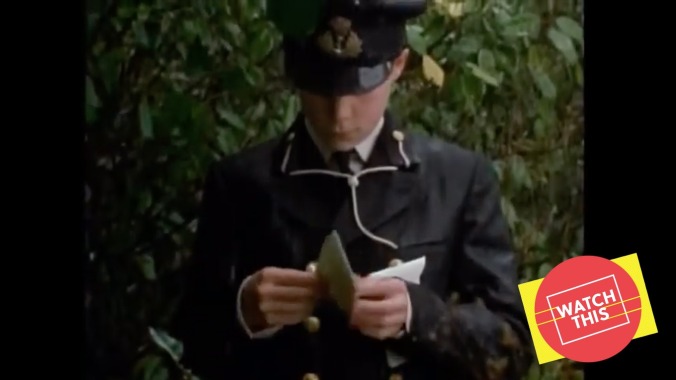The Winslow Boy is a superlative courtroom drama—minus the courtroom

Watch This offers movie recommendations inspired by new releases, premieres, current events, or occasionally just our own inscrutable whims. This week: Because the new Conjuring movie didn’t scratch our itch for (supernatural) legal fireworks, we’re coping with five days of courtroom dramas.
The Winslow Boy (1999)
Courtroom dramas generally involve heinous crimes, and build to a climactic trial sequence replete with withering cross-examinations and soaring lawyers’ oratory. Not so The Winslow Boy, which chronicles the effort to defend a 14-year-old who’s been expelled from military school for allegedly stealing and cashing a fellow classmate’s postal order in the amount of five shillings. Drawn from a stage play written by Terence Rattigan and first produced in 1946, The Winslow Boy is based on an actual case that became a cause célèbre in 1910, with all of England apparently consumed by the fate of one lad’s reputation. The Edwardian setting provides an unusual constraint for David Mamet, whose previous films had all been set in the present day, written by himself, and notable for their copious profanity. (The Winslow Boy, by contrast, is one of very few films not expressly made for small children to receive a G rating.) What’s most notable, however, is Rattigan’s decision, which Mamet retains, to never enter the courtroom itself, focusing instead on the boy’s family and their exhaustive efforts to clear his name. We hear of what happens at trial—and even of the verdict—only via secondhand reports.
That might sound pointlessly perverse, but Rattigan imagines a richly detailed personal context for the case, and Mamet brings it to the screen with a metronomic precision that never feels remotely stage bound. He’s aided, especially during the initial unfolding of the narrative, by Nigel Hawthorne’s towering performance as Arthur Winslow, a man of unwavering rectitude who, once convinced of his son’s innocence, refuses to let the matter drop. Public opinion initially stands against him, thanks in part to editorial cartoons that mock the case as a waste of everyone’s time; what’s more, the incident having taken place at a military school creates legal roadblocks that require enormous reserves of time and money to circumvent. Arthur’s own wife (Gemma Jones) begs him to just let it go, especially since young Ronnie (Guy Edwards) is faring perfectly well at another school. Instead, he hires the country’s most celebrated barrister, Sir Robert Morton (Jeremy Northam), creating even more of a stir—one that’s not especially in his favor.
Despite avoiding the trial, The Winslow Boy does feature one superlative cross-examination: Deciding whether or not to take on the case, Sir Robert subjects Ronnie to a line of questioning in his office that starts out hostile and gradually turns downright abusive as Sir Robert pokes holes in the boy’s story, accusing him of being both a thief and a liar. Northam really digs into the touch of self-satisfied sadism underlying his character’s decorum, which extends to not telling Ronnie’s horrified family what he’s up to even after he’s achieved his goal. He’s so persuasive that a colleague, upon hearing one especially damning question, silently closes his notebook. (This is the sort of expert visual touch for which Mamet, because he’s so well known as a writer, rarely gets any credit.) It’s genuinely surprising when Sir Robert follows this evisceration with a request, as he heads out for a previously scheduled luncheon date, that all of the relevant case files be sent to his office immediately. “But will you need them now?” the colleague who’d closed his notebook asks, confused. “Oh, yes,” replies Sir Robert, with a smug smile. “The boy is plainly innocent.”
Still, it’s The Winslow Boy’s apparent digressions that truly make it special. While Rattigan’s play may seem an odd fit for Mamet (apart from its subject of a false accusation, which the latter had tackled much more controversially in his own play, Oleanna), this is a work that’s every bit as rooted in the intricacies of language and the way that people use it both to communicate and to obfuscate. “It’s hard for me to find the words with which to thank you,” Arthur tells Sir Robert at one point. “Pray do not trouble yourself to search for them, sir,” the barrister uncomfortably deflects. “Let us take these rather conventional expressions of gratitude for granted, shall we?”
This odd amalgam of loquaciousness and reticence reach their zenith in the stealth romance that gradually develops between Sir Robert and Arthur’s adult daughter, Catherine (Mamet regular and real-life spouse Rebecca Pidgeon), a suffragette who’s deeply suspicious of his motives for taking the case. A miniature version of Pride And Prejudice unfolds alongside all of the legal machinations, as it becomes clear that Sir Robert’s motives, while definitely less than noble, are not at all what she assumes. The film, like the play (and like an earlier adaptation, released in 1948), concludes with a pitch-perfect exchange of dual impertinence, suggesting more playful skirmishes to come.
Availability: The Winslow Boy is currently streaming free for subscribers on Amazon Prime. It’s also available for digital rental and/or purchase via YouTube, Vudu, and DirecTV. If you’re okay with standard definition and having commercials interrupt the movie, it’s also free on Tubi TV.